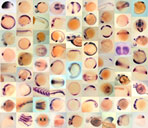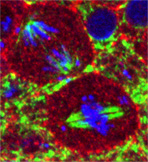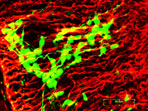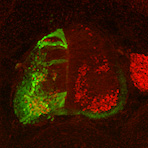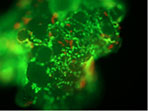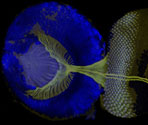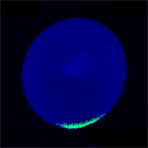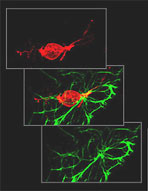Jacobson Lab
|
Communication between cells plays a critical role in regulating many aspects of development. PDMG faculty study morphogens and other growth factors, cellular receptors, signal transduction systems, and the role they play in cell survival, cell differentiation, and morphogenesis.
|
Faculty Researchers:Kathryn Albers Gerard Campbell Brian Davis Lew Jacobson |
Brooke McCartney Jonathan Minden Beth Stronach Michael Tsang
|
Cell Specification, Cell Differentation and Stem Cells
Cell differentiation is the process by which embryonic cells become progressively more specialized in structure and function. PDMG faculty study mechanisms that cause cells to choose specific fates during development and the molecular control of cell differentiation. |
| |
Faculty Researchers:Nathan Bahary John R. Chaillet Deborah Chapman Chuck Ettensohn Neil Hukriede |
Cynthia Lance-Jones Jon Minden Paula Monaghan-Nichols John Pollock Paul Sammak Jerry Schatten |
|
Evolutionary Developmental Biology
|
The genetic/molecular programs that underlie the development of extant organisms have arisen gradually over many hundreds of millions of years of evolution. The diverse animal and plant morphologies we see are the result of evolutionary changes in genetic programs that control development. PDMG faculty investigate the evolutionary modification of developmental pathways.
Faculty Researchers:Rick Elinson Charles Ettensohn Dannie Durand Javier Lopez |
Genomes and Gene Regulation
The "blueprint" for development is present in the genome. A major goal of developmental biologists is to understand the flow of information from the nucleotide sequence of the genome to the morphology and function of the organism. PDMG faculty study the regulation of gene expression, the structure of gene networks, and the stability of genetic programs that control development. |
| |
Faculty Researchers:M. Alleman Ziv Bar-Joseph John R. Chaillet Dannie Durand |
Charles Ettensohn Javier Lopez Jerry Schatten |
|
Morphogenesis
McCartney Lab
Yip Lab
|
The final readout of the genetic program of development is morphology. The shape of tissues, organs, and other anatomical structures in the embryo is controlled by a suite of cell behaviors that includes cell movement, cell adhesion, cell death, and cell proliferation. PDMG faculty seek to understand how cells (or parts of cells, such as axons) migrate directionally in embryos, how cell sheets change their shape, how cells adhere, and the role of cell polarity, the cytoskeleton, and the extracellular matrix in these morphogenetic processes. |
|
Faculty Researchers:Charles Ettensohn John Doctor Willi Halfter Jeff Hildebrand Carl Lagenaur Cynthia Lance-Jones
|
Brooke McCartney Jon Minden Paul Sammak Beth Stronach Xiangyun Wei
|
|
Neural Development
| The formation of the nervous system exemplifies all the major mechanisms that underlie development. It culminates in the formation of a remarkably complex system that remains plastic even after birth. PDMG faculty study nervous system development using approaches ranging from molecular to systems-level analysis. |
Lance-Jones Lab 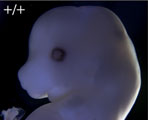
Monaghan-Nicols Lab
|
|
Faculty Researchers:Katherine Albers Alison Barth Justin Crowley Brian Davis Miguel Estevez Willi Halfner Carl Lagenaur |
Cynthia Lance-Jones Jon Minden
Paula Monaghan-Nichols John Pollock Paul Sammak Joseph Yip |
|
Organogenesis
Doctor Lab
Pollock Lab
|
Several PDMG faculty are interested in the development of specific organ systems within embryos, such as the skeletal system, kidneys, vascular system, and muscle. |
|
Faculty Researchers:Nathan Bahary Deborah Chapman John Doctor
|
Neil Hukriede Lew Jacobson
|
|
Pattern Formation
Campbell Lab
Ettensohn Lab
|
Pattern formation is the process by which reproducible spatial patterns of differentiated cells arise during development. At the earliest stages of development, pattern formation is entrained by the polarity of the unfertilized egg and/or cues provided by the sperm. The initial regionalization of the embryo leads to the emergence of progressively more refined patterns of cell types later in development. PDMG faculty study pattern formation in animal embryos as diverse as sea urchins, fruit flies, nematodes, and mice. |
|
Faculty Researchers:Gerard Campbell Deborah Chapman Rick Elinson Charles Ettensohn Neil Hukriede
|
Cynthia Lance-Jones Jon Minden Paula Monaghan-Nichols John Pollock Michael Tsang Xiangyun Wei
|
|
.
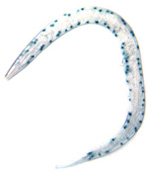
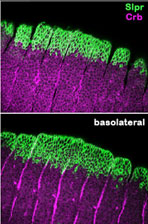
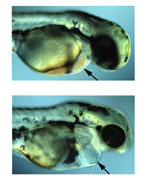
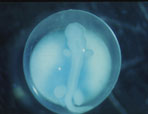 Elinson Lab
Elinson Lab 